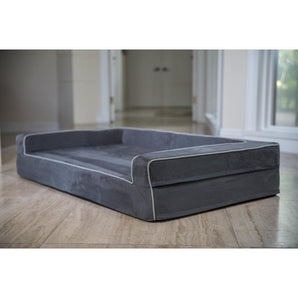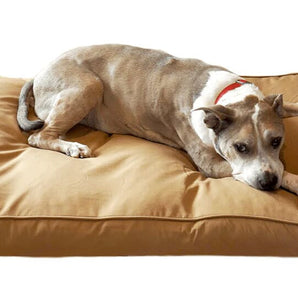Did you know that around 25% of dogs are diagnosed with arthritis in their lifetime? Arthritis, or osteoarthritis, is a joint disease that deteriorates the joints irreversibly.
Arthritis in dogs is common and can happen because of a number of factors. But how do you know when your dog is showing signs of arthritis and how can you treat it?
Read on to learn the answers to your questions and much more with our comprehensive guide.
Signs of Arthritis in Dogs
"How do I know if my dog has arthritis pain?" is a common question many dog owners ask themselves. Understanding what arthritis is and what signs to look for will lead you to the answer.
Arthritis is an inflammation of the joints and is common in dogs. This damage causes pain, stiffness, and discomfort.
The most common sign of arthritis in dogs is the inability to get up or lay down. Some, but not all, dogs will vocalize when they're feeling pain. You'll know your dog is in pain through other ways if they don't vocalize it.
Some of the other signs you may notice in a dog with arthritis include:
- Unwilling to exercise
- Stiffness or lameness after resting for periods of time
- Worsening signs when damp or cold
- Licking the joints (saliva staining)
- Slower movement than usual (loss of stamina)
- Reluctance to walk up or down the stairs
- Inability to jump off of furniture
- Reluctance to have somebody parts touched
- Cracking and popping when the joint moves
- More accidents in the house
You may also see a mood change in your dog. Because they're in pain, they'll come off as grumpy and may have unexpected aggression towards you, other humans, or other dogs.
What Dogs Are Most Prone to Arthritis?
Generally, this condition is more common in older dogs, but it can happen to a dog at any point in their lifetime. Arthritis can develop at an early age in a dog with joint and bone development problems.
Most cases of arthritis in dogs occur because of abnormal rubbing of the joint. Depending on the cause of arthritis, one or more joints may be affected.
After ligament damage, your dog may struggle with joint instability that causes arthritis. Other causes that lead to the rubbing of the joint include damage to cartilage development or abnormal development.
Trauma, such as fractures, can also cause abnormal rubbing of the joint.
A dog's build (body conformation) can also cause arthritis. This is one reason why large dog breeds are more prone to getting this condition like older dogs.

Arthritis in Older Dogs
When dogs age, the joints start thinning on the surface of the cartilage. Cartilage cells die and release enzymes causing inflammation in the joints. They also cause the release of excessive joint fluid.
Bony growths will begin to develop to combat this issue. As the cartilage begins to thin more, the bone beneath the cartilage will deteriorate.
The additional wear and tear of a dog's joints as they age may cause them to have arthritis.
Arthritis in Large Breed Dogs
Large breed dogs are more likely to have poor conformation which can make them more likely to get arthritis. Bigger dog breeds like golden retrievers, labrador retrievers, and german shepherds fall into this category.
What Body Parts Can Arthritis Affect in Dogs?
A veterinarian may be able to tell which joints are affected by a pain and discomfort examination. This could be through joint flexion and extension.
It's common for them to suggest more tests, like x-rays, to help confirm arthritis and locate where it is exactly. For some dogs, there may be an underlying cause. Often, blood samples are necessary to rule out other medical conditions.
Some conditions could be causing arthritis or contributing to the pain. Those conditions include:
- Metabolic illnesses
- Endocrine conditions (hypothyroidism or Cushing's disease)
- Cardiac conditions
- Cancer (most likely bone cancer)
- Anemia
The most common body parts arthritis can affect in dogs are the hips, legs, back, and knees.

Arthritis in Dog's Hips
Arthritis in a dog's hips is known as hip dysplasia. This disease is genetic and happens because of a malformation of the hip joint, otherwise known as the ball and socket joint.
This chronic inflammation occurs because the cartilage in the joint deteriorates and misaligns, causing inflammation and pain. A dog with this condition may have to undergo one of many surgical procedures.
Medications are helpful to alleviate some of the pain that comes from hip dysplasia.
You can avoid getting a puppy that is at risk of hip dysplasia by purchasing from a certified breeder. A breeder will have both parents certified against this condition and other inherited joint diseases.
These dogs will get a certification through the Orthopedic Foundation for Animals.
Arthritis in Dog's Legs
A dog's front legs carry the most weight because of the head and chest. They are the most important to examine for arthritis.
Arthritis in a dog's legs can also refer to elbow dysplasia. However, the distinction comes from arthritis in legs not being hereditary while elbow dysplasia is.
A dog with elbows dysplasia has bones that won't develop normally. This causes damage to the cartilage and misalignment in the joints. Sometimes it can even cause bone chipping that leads to chronic inflammation.
You'll most likely see this condition in large breed dogs. Often, surgery is necessary to correct the issue.
Arthritis in Dog's Back
Spinal arthritis occurs during old age and is one of the more common types of bone diseases a dog could have. This type of arthritis gets caused by degeneration of the connective tissues and joints in the spine.
This condition is gradual and only becomes severe as the years go on. Spinal arthritis can lead to other health-related problems and make your dog lethargic.
Your vet should recommend some natural supplements if your dog is suffering from arthritis in the back. Changing your pet's diet can also help slow down the deterioration of the joints and bones.
Surgery is not usually necessary unless arthritis becomes too severe. All it should take is some medication and natural lifestyle changes to relieve your pooch of pain.
Arthritis in Dog's Knees
Smaller dog breeds may suffer from arthritis in the knees, known as knee dysplasia. Like hip dysplasia, this condition gets inherited and causes malformed knee joints.
Some of the dogs with this type of arthritis will also have luxating patella. This is when the knee caps pop in and out of position. A dog dealing with this will limp until the knee cap returns to the right position.
To correct knee dysplasia, surgery is usually necessary.
How to Treat Arthritis in Dogs
If you notice your dog showing signs of arthritis, the next question you'll likely ask yourself is "What can I give my dog for arthritis?" or "How can I help my dog with arthritis pain?".
A suspicion of arthritis may lead to the vet requiring treatment over your dog's lifetime. There are a variety of treatments and natural remedies for arthritis in dogs, including everything from medication to beds to exercise. A vet can work with you to recommend the best long-term solution.
It's important to note that arthritis is not a curable condition. When the joints have damage, they won't repair themselves completely.
Luckily, there are ways for pets to deal with arthritis in a pain-free manner. There are medication options and management options to control more deterioration.
Depending on the severity level of arthritis, you may not need veterinary intervention at all. Some pets only need simple lifestyle changes while others must go through a complex surgery.
A veterinarian may recommend any of these treatment options below. They're also beneficial to try if you cannot get your dog proper vet care for arthritis.
Supplements
For dogs, there are many joint health and healthy cartilage supplements available. They generally contain chondroprotective substances like:
- Glucosamine
- Chondroitin
- MSM
- Green-lipped mussel
Veterinarians may recommend a specific supplement to you depending on the severity of arthritis in your dog. Supplements that include anti-inflammatory effects may help a dog with arthritis too.
Omega-3 fatty acids are a great source of anti-inflammatory properties. Most dogs will have this in their diet, but some need higher levels. In this case, you can get them extra supplements.
There isn't much research on how these supplements can benefit a younger dog. If you want to give your pup these supplements to avoid arthritis in the future, you should speak to your veterinarian first.
They'll take in other considerations, such as genetics and diet, to decide if these supplements are right for your pet.

Bully bites soft chews are for bully breeds and large breed dogs to aid in joint support. You won't have to force your dog to eat these as they are basically treated with a delicious, yet nutritious taste.
These chews contain the highest quality pharmaceutical ingredients and are blended with an anti-inflammatory and a Cox-2 inhibitor. They help reduce pain and inflammation while increasing mobility.
The blend also includes multivitamins and joint-relieving ingredients. All of this gets packed together as a low allergy formula.
Beds
If your dog is welcome on your bed, provide them with carpeted or padded steps to help them. This will be easier on their joints.
Well-padded bedding located away from damp or cold drafts is a great way to help a dog with arthritis at home and can help prevent pressure-point calluses from developing. Bully Beds provide orthopedic options your dog with arthritis can benefit from.

Orthopedic Infrared Dog Bed
An orthopedic infrared dog bed by Bully Beds is washable and waterproof. It benefits the dog's entire body including the joints, hips, and elbows.
An infrared bed can speed up recovery times if your dog underwent surgery. It is also great for general day-to-day use because it increases energy levels and stamina.
This bed works to soothe hip dysplasia as it provides thermal insulation to help with the natural body temperature. Even after washing hundreds of times, your dog can still experience these benefits.
The far infrared ray (FIR) emission helps promote dilation of blood vessels which increases blood flow. Sore areas can recover and heal faster.

Original Orthopedic Bully Bed
The original orthopedic bully bed was created with large dog breeds in mind. Bigger breeds are more likely to get arthritis because of their body condition and can use this bed for comfort.
Even the foam used was designed especially for large breed dogs. The non-toxic material helps to reduce discomfort from hips and joints. These beds can also get washed without risking the beneficial factors.

Orthopedic 3 Sided Bolster Bed
This 3 sided orthopedic bed is similar to the original orthopedic bully bed. The difference is that it has bolsters on three sides for canines that enjoy leaning on an edge. It's a more secure and supporting option.
Massages
Muscle massages can stimulate blood flow to the atrophying muscles which relieves some of the pain from arthritis. If you don't know the proper techniques, you can reach out to a certified canine massage therapist.
Warm materials over sore joints can be helpful. However, it's important to practice this method with care to avoid injury from excess heat.
Along with massages, a dog with arthritis may benefit from therapy or therapeutic laser treatment. Acupuncture has made dogs more comfortable and mobile when they have this condition.
Therapeutic laser treatment may be the more expensive option, but it can improve arthritic conditions. This laser therapy stimulates blood flow to tissues.
Exercise
Arthritis tends to be more severe in dogs that are overweight and unfit. It's important to add weight control and exercise management to the treatment process.
When you minimize the joint load and maximize the range of movement, your dogs will benefit. It's important to maintain reasonable exercise standards for dogs with arthritis.
If your dog has early arthritis that is only mild, they should be getting a lot of exercises. An older dog with severe cartilage deterioration won't be able to get as much exercise.
If arthritis did not occur from another condition, non-weight-bearing exercises are your best bet. Swimming is a great exercise for dogs with arthritis.
Your veterinarian may be able to help you design an appropriate exercise program for your pooch. If not, there are canine rehabilitation practitioners ready to help you out.
Diet
Diet and exercise go hand in hand when it comes to creating a better lifestyle for your dog. To keep your dog's symptoms from going amok, you should feed them an anti-inflammatory diet.
Food acts as medicine or toxin depending on what you feed your dog. Be wary when buying certain dog food brands. They may say they are beneficial for arthritic conditions but contain artificial ingredients and fillers.
Before making a purchase, do some research on what is really in the dog food you are buying.
Human food like vegetables and fruits are safe for canines and beneficial to managing their arthritis pain. Some of the best foods you can give to your dog include whole foods, oils, herbs and spices, and, of course, supplements.
Whole foods that contain antioxidants and fibers can really help your pet. Leafy greens, lean protein, and fatty fish are also great options.
Along with the anti-inflammatory omega-3 oils, you can give your dogs coconut oil and flaxseed oil. You can drizzle these over dog food or use them to sauté their veggies.
Turmeric, cinnamon, fresh ginger, and parsley are great herbs and spices to give your dog as well. As an added plus, parsley will freshen their breath!
For a dog with arthritis, there are five main foods types you should avoid feeding them, those being:
- Grains
- Corn
- Omega-6 fatty acids
- Fatty proteins
- Added sugars, salts, and artificial additives
If a dog food brand has any of these on its ingredients list, it's best to look for something else. Always read the label carefully when choosing dog food and lookup an ingredient if you aren't sure.
Pharmaceuticals
There are plenty of pharmaceutical options to choose from to help alleviate pain from arthritis in dogs. It's essential not to give your dog over-the-counter medications unless prescribed by your veterinarian.
Many dogs have died from over-the-counter pills that may seem harmless. For example, Ibuprofen is toxic to canines.
Pharmaceuticals you can use include:
Adequan Injections
Adequan injections can treat arthritis in dogs along with other joint diseases. Adequan works to provide the body with cartilage building blocks that help it repair its own tissue.
Most dog owners don't opt for these injections because they are expensive. However, if you have the money to spare, it's a good investment.
Over three weeks, your dog will undergo six injections. The only side effect known is the possibility of increased bleeding. This side effect is rare and most dogs see advantages with these injections.
Tramadol
Tramadol is an analgesic synthetic opioid. It's not an anti-inflammatory, but it is a potent pain medication that is safe for dogs to use.
This medication is rather inexpensive, but it does come with potential side effects. The two main side effects your dog may experience are sedation and constipation.
With the proper dosage amount, you shouldn't run into either of these issues.
Gabapentin and amantadine are similar drugs that work like tramadol. They target the nervous system to strengthen pain signals by altering the transmission.
Steroids
Because steroids have an anti-inflammatory effect, they remain part of the conversation on arthritis in dogs. The problem with steroids is that they will break down the tissue in the body over time. This includes the breakdown of joints.
Even using steroids a few times can cause other conditions like diabetes, liver inflammation, Cushing's disease, and more.
To prevent these conditions and ulceration or gastric erosion, a vet will also prescribe histamine blockers, gastrointestinal protectants, or proton pump inhibitors. If any symptoms develop, including those of ulcers, the use of steroids should not continue.
Now that we have the negatives out of the way, using steroids for older dogs for only one or two months can benefit them in the long run. This option is best for dogs with advanced arthritis.
Non-Steroidal Anti-Inflammatory Drugs (NSAIDs)
Non-steroidal anti-inflammatory drugs (NSAIDs) are often used when none of the above options work. The most common NSAIDs for dogs include the following:
- Rimadyl
- EtoGesic
- Previcox
- Metacam
- Feldene
- Deramaxx
These drugs should be used with caution and not casually given to your canine. Even though they do wonders for reducing pain and inflammation, they have numerous side effects compared to other drugs.
Some side effects of NSAIDs are even fatal. The development of the side effects is not always easy to spot. Once the side effects begin, they are irreversible.
Just a few days of taking NSAIDs could lead your dog to have an organ system failure. Other adverse events like seizures and gastric ulcers may occur.
If you plan to give your dog one of these drugs, you should first have them undergo blood work to ensure their organs are working normally. Blood work will also check for the right amount of red blood cells.
Once your dog has started taking NSAIDs, the tests should continue. Blood work after the fact will show if your dog's body is tolerating the medication.
One of the most common symptoms to look for is frequent urination and water consumption. If any symptoms occur, stop giving your dog NSAIDs immediately.
Pay attention to your dog when giving them NSAIDs. They are unable to tell you when something is wrong, so you must know what to look for.
You should never combine these drugs with any form of steroid or aspirin. Doing so can lead to death.
Taking Care of Arthritis in Dogs
In most instances, arthritis in dogs occurs because of old age or genetic factors. Because arthritis in dogs is common, there is a lot of things known to alleviate and treat their pain.
As a dog owner, you'll want to do everything in your power to keep your pooch happy. After visiting your veterinarian, consider the tips and recommendations in this guide to make living with arthritis as normal as possible for your pet.
Contact us today to find out which supplement and dog bed is right for your canine with arthritis.





